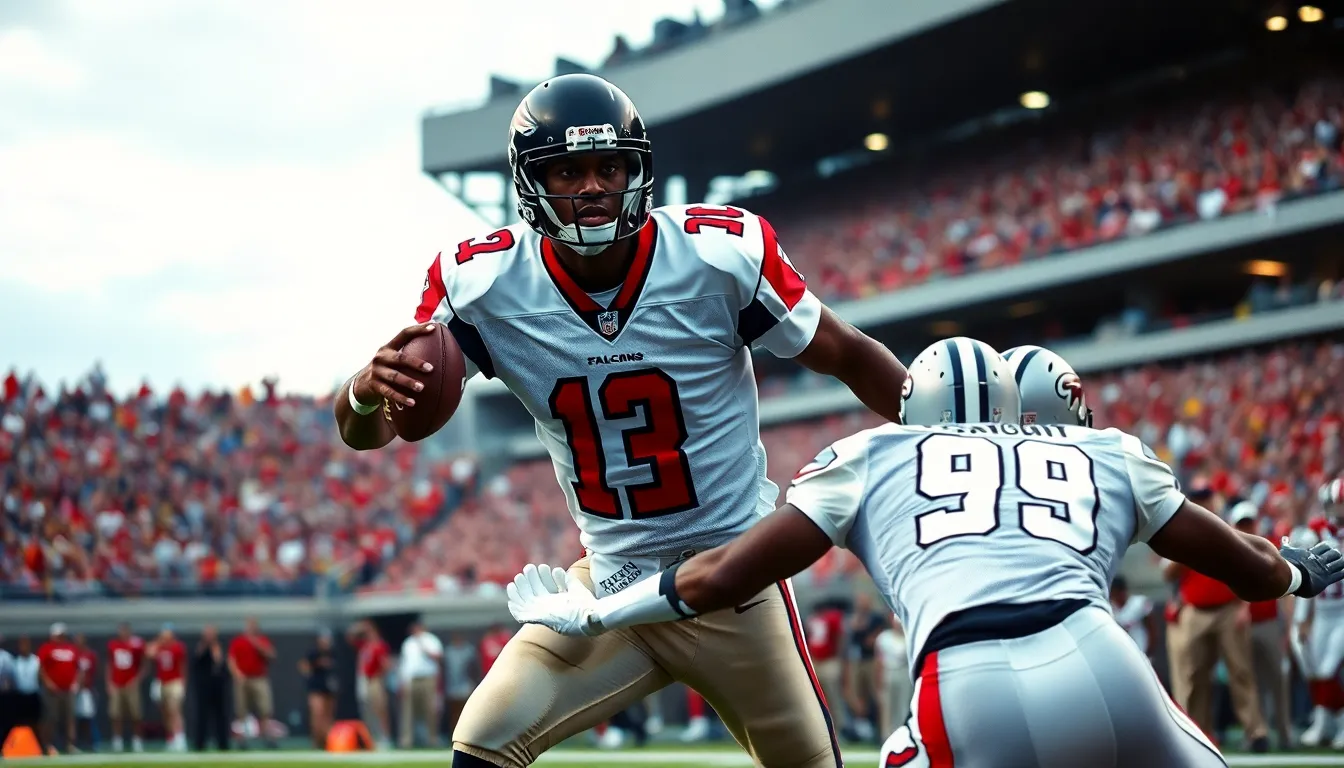Table of Contents
ToggleMichael Vick electrified the NFL with his jaw-dropping speed and unmatched agility, turning the quarterback position on its head. Fans watched in awe as he dodged defenders like a cat on a hot tin roof. But amidst all the highlight reels and record-breaking plays, one burning question remains: did he ever hoist the coveted Lombardi Trophy?
Despite his undeniable talent and charisma, Vick’s Super Bowl dreams never quite materialized. It’s a tale of near misses and what-ifs that leaves fans scratching their heads and wondering what could have been. So grab your favorite snack and settle in as we dive into the highs and lows of Vick’s career, exploring the reasons why this dynamic player never found himself basking in the glory of a Super Bowl victory.
Overview of Michael Vick’s Career
Michael Vick’s career began in 2001 when he was drafted first overall by the Atlanta Falcons. He quickly became known for his unique combination of speed and arm strength. Breaking records, he set the NFL standard for rushing yards by a quarterback, accumulating 1,039 yards in 2006.
In 2006, Vick made his first Pro Bowl appearance, a testament to his talent and athleticism. During his time with the Falcons, he led the team to the playoffs multiple times, yet the elusive Super Bowl remained out of reach. Complicating matters, issues off the field in 2007 led to his suspension and imprisonment, which disrupted his promising career.
After serving time, Vick returned to the NFL in 2009 with the Philadelphia Eagles, revitalizing his career. In 2010, he was named the NFL Comeback Player of the Year after throwing for 3,018 yards and 21 touchdowns. His dynamic playing style continued to impress fans and analysts alike.
Throughout his career, Vick played for several teams, including the Jets and the Steelers, before retiring in 2017. Despite his numerous accolades, including being a three-time Pro Bowl selection, fans often reflect on the fact that he never won a Super Bowl. Missed opportunities defined Vick’s post-season journey, but his impact on the game of football remains undeniable.
Michael Vick’s legacy includes not only his extraordinary athletic performance but also the way he changed perceptions of the quarterback position. His career signifies the blending of traditional quarterback skills with unique athleticism, influencing future generations of players.
The Road to the NFL

Michael Vick’s journey to the NFL showcased his extraordinary talents and determination. His early life and college career paved the way for a remarkable professional experience.
Early Life and College Career
Born in 1980 in Newport News, Virginia, Vick exhibited athleticism from a young age. He played football and excelled in basketball and track. Vick attended Virginia Tech, where he became a standout quarterback, leading the team to a Bowl Championship Series appearance in 1999. His electric playing style captivated fans, and he set a school record for total offense. In 2000, he declared for the NFL Draft after an impressive college career, which included significant accolades.
Draft and Rise to Stardom
In 2001, Vick’s life changed when the Atlanta Falcons selected him first overall in the NFL Draft. Instantly, he became a focal point of the Falcons’ offense. His ability to throw and run redefined the quarterback position, helping him earn a Pro Bowl selection by 2006. Vick set the league’s rushing record for a quarterback that same year, further solidifying his stardom. Although playoff appearances came, the elusive Super Bowl victory continued to evade him. His dynamic talent left a lasting mark on the NFL.
Vick’s Performance in the NFL
Michael Vick’s NFL performance stands out for its unique blend of athleticism and skill. He redefined the quarterback role with his exceptional speed and agility, making his gameplay electrifying.
Key Statistics and Records
Vick set impressive records during his career. He accumulated 22,464 passing yards and 133 rushing touchdowns, ranking amongst the top quarterbacks. In 2006, he recorded 1,039 rushing yards, a record for quarterbacks. The performance led to his first Pro Bowl selection, showcasing his ability to excel both in the air and on the ground. In addition, Vick boasts over 170 career touchdown passes, marking him as a dynamic dual-threat player. His game-changing abilities influenced how teams strategize around the quarterback position.
Impact on the Game
Vick significantly impacted the evolution of the quarterback position. He prompted teams to re-evaluate the skill sets necessary for success under center. Defenses scrambled to adapt, as they faced a quarterback capable of converting runs into big plays. His presence inspired younger players to incorporate speed and athleticism into their game. Vick’s style shifted the dynamics of offense, leading to the development of schemes suited for mobile quarterbacks. Many current players cite him as a pivotal influence in their playing careers, cementing his legacy within the sport.
Super Bowl History
The Super Bowl represents the pinnacle of success in professional football, showcasing the league’s top teams. Every year, millions of fans watch this championship game, which typically features two conference champions: the AFC and the NFC. The event has grown into a cultural phenomenon, featuring elaborate halftime shows and hosting numerous celebrities. Winning this title stands as the ultimate achievement for athletes and franchises alike.
Overview of the Super Bowl
The Super Bowl began in 1967, originally as a merger between the NFL and AFL champions. Each game brings intense competition, with notable moments that define legacies. Some teams historically dominate, such as the New England Patriots and Pittsburgh Steelers. Statistical records, including touchdowns and yards, shape narratives surrounding individual players and their performances. This annual spectacle showcases the culmination of a long season, offering fans thrilling matchups and unforgettable plays.
Teams Vick Played For
Michael Vick’s NFL career involved key teams that shaped his trajectory. He started with the Atlanta Falcons, where he gained notoriety for dynamic plays and remarkable athleticism. Vick later joined the Philadelphia Eagles, revitalizing his career in a backup role before becoming the starter. His brief stints with the New York Jets and Pittsburgh Steelers marked the final years of his professional journey. Throughout these tenures, he influenced game strategies and inspired a new era of mobile quarterbacks.
Did Michael Vick Win a Super Bowl?
Michael Vick never won a Super Bowl during his NFL career. Despite his remarkable talents, he faced challenges in achieving the pinnacle of success in football.
Analysis of Playoff Appearances
Several playoff appearances highlighted Vick’s career, notably with the Atlanta Falcons. His first notable postseason came in 2002 when the Falcons reached the NFC Championship Game. In 2004, he secured a playoff victory against the Rams, showcasing his unique abilities. Vick’s dynamic playing style brought excitement to each game. However, he never advanced beyond the NFC Championship, often falling short against formidable opponents. His time with the Philadelphia Eagles included playoff games, yet the elusive Super Bowl remained just out of reach.
Legacy Without a Super Bowl Win
Vick’s legacy remains significant despite the lack of a Super Bowl victory. His influence on mobile quarterbacks reshaped the way the position is played. Exceptional athleticism combined with traditional skills set him apart. Fans and analysts view his career through the lens of missed opportunities, with countless discussions on what could have been. Notable accolades include three Pro Bowl selections and the NFL Comeback Player of the Year award. Vick’s impact on football culture cannot be understated, inspiring future generations and leaving an indelible mark on the sport.
Michael Vick’s career is a testament to talent and resilience in the face of adversity. While he never won a Super Bowl his impact on the game is undeniable. Vick’s unique playing style revolutionized the quarterback position and inspired a new generation of athletes.
Despite the absence of a championship ring his legacy continues to resonate throughout the NFL. Vick’s journey showcases the highs and lows of professional sports and serves as a reminder that greatness isn’t solely defined by trophies. His story remains an integral part of football history influencing both players and fans alike.



